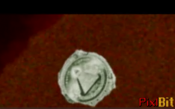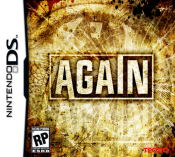It's sad that this is Cing's swan song (they filed for bankruptcy in March.) Hopefully Nintendo will localize Last Window. However, considering that Another R not being released in North America, I'm not holding my breath.
Again Review
|
|
See PixlBit's Review Policies

On 04/22/2010 at 10:13 PM by Chessa DiMola What might make for a good novel doesn't always make for a good game. |

Only for the most die-hard Cing fans.
The Japanese independent game developer, Cing, is well known for creating some very unique and memorable gaming experiences. From Trace Memory to Little King's Story, they have produced a variety of titles that stand out from their competitors. One of their strongest points was creating a gameplay experience around an intriguing storyline, although their games have a tendency to be a bit too wordy. Their latest, and potentially final title, Again, is yet another novel-like game in which players must collect information from both the present and the past. Unfortunately, Again lacks every good aspect found in Cing's previous works, leaving their last gaming legacy to stand as an experience that is bland, lifeless, and utterly disappointing.

My initial impression of Again was positive; I was quickly immersed into a world where a series of murders from nineteen years prior had finally caught up to the present. I was introduced to the main character, J, and his gift of seeing into the past fairly quickly, and saw the potential that his gift could have on the storyline and gameplay. Since many of Cing's other titles have always relied on one unique mechanic to keep gamers hooked from beginning to end, I was sure that I had already found it within minutes of starting the game.
Shortly thereafter, the game took on a different type of persona. Despite being advertised as an interactive novel, it seemed as though Cing was trying to make Again more of an interactive police drama (containing an opening title sequence and all). If there's anything gamers know all too well, it’s that what succeeds in one medium of entertainment doesn't always translate well to another. As such, though the concept of Again is most certainly appealing, the execution of the game falls short.

For all intents and purposes, Again is no more than a point and click adventure where players will explore crime scenes and do a whole lot of conversing. The unique aspect of Again is that players hold the DS on its side rather than the traditional way, which comes in handy when having to compare crime scenes from the past with their current state. Though the majority of the game will leave players merely tapping the touch screen, the crime scenes allow players to walk around in 3D space.
While investigating, players will need to be on the lookout for any differences between what is seen in the past, and what is seen in the present. Finding these differences usually results in an instant flashback detailing the significance of a certain item or room location. In order to trigger the flashbacks players must utilize J's vision by holding down there stylus on a particular object for a certain amount of time, after which the flashback will play or notify players that there is something more that they must do with the area. While this may be a minor complaint, even the slightest movement of the stylus when trying to trigger J's visions will interrupt the process forcing players to start over.

In between scouring crime scenes, players will collect information from many sources, including other law enforcement officials, a reporter, and individuals who were related to the parallel cases 19 years prior.
Though the crime scenes are the highlight of the game, it takes far too long in between talking to other characters to reach them, and are incredibly short compared to the time it takes to get to them. Like many of Cing’s other titles there is plenty of good gameplay, however it is suffocated by unnecessarily lengthy and contrived sets of dialogue. With each interview and character encounter, the same sets of facts are repeated over and over again, just from a different perspective. While I understand that this may be a realistic method of interrogation and fact finding, it makes for a very tedious and boring gameplay experience.

This is made even worse by the way that text is displayed in the game. Players are forced to read against a drab grayish-black background with absolutely nothing going on around it. On the other screen, the game has a variety of character animations, but because of the way the system is held, players will likely ignore what occurs on that screen. Similar games, like the Ace Attorney series, have done a much better job connecting the text with the character animations, making the text-heavy parts of the game more entertaining.
Speaking of the character animations, as I stated before, I understand the realistic cop drama experience that Cing was trying to create, but using real actors instead of animated ones was a bit much. Not only did seeing the real actors send me reeling into nightmarish flashbacks of terrible Sega CD titles, but in all honesty, they're just really cheesy and lame. Generally each character has several different animations detailing certain emotions, some of which players will notice do not ever fit the on-screen dialogue. So after seeing the same animation looped over and over, as stated above, players will come to just ignore it, making the dialogue that much more lengthy and boring.
Sadly, I've said everything I can about Again because, to be honest, there just isn't very much to the game. It's a title comprised of a generic storyline and decent gameplay, which is sadly buried beneath entirely too much dialogue. Despite it being advertised as an interactive novel, I cannot forgive the game for containing barely any gameplay. Had the ratio of text to actual gameplay been more balanced, Again may have had some true potential. However, as it stands, it is more like a boring novel with a terribly cliché storyline that would most likely be on the shelf at your local dollar store. Even fans of Cing's previous works who can tolerate the massive amount of text should skip Again.









Comments